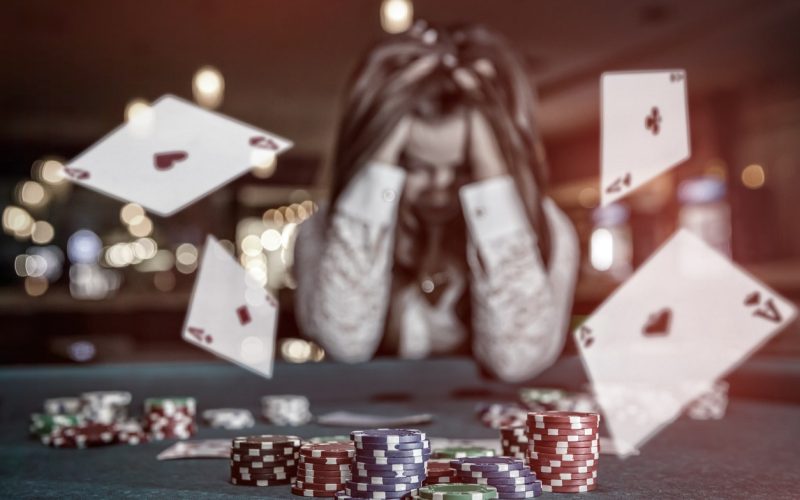Battling with gambling addiction can get devastating, especially if it seems like you can’t find a way out.
But, you might get some comfort to know that you’re not alone as around 10 million people in the US also battle with this problem.
How gambling addiction looks like
Do you have an uncontrollable urge to keep gambling even when it visibly affect your health and relationship with others?
The whole concept works much like drugs and alcohol as it stimulates your brain’s reward system, leading you to keep depleting your savings to chase bets that lead to losses.
It also pushed you to hide the behavior from others while accumulating debt and sometimes pushing to theft and fraud just to support the behavior.
Gambling addiction is a severe condition that can destroy lives if left unchecked. What’s more disheartening is that it can happen to anybody from any walk of life.
Why do some people gamble?
Gambling may seem like fun, but if you’re addicted to gambling, you might experience serious financial, emotional, physical, or relationship problems as a result.
Some people who gamble become obsessed with winning money or other possessions. Others gamble because they feel depressed or anxious.
Still, others gamble because they enjoy the excitement of playing cards or slot machines.
How to stop gambling addiction
The first step to take when you want to stop gambling addiction is to understand why you do it and avoid triggers and temptations.
If you or your loved one suffers from a gambling addiction, this guide will show you how to stop for good.
1. Recognize When You Gamble
The first step toward stopping your gambling addiction is recognizing when you gamble. Ask yourself questions such as:
- When did I start gambling?
- Who am I gambling with?
- Where do I go to play?
- Am I willing to make changes in my lifestyle?
- Will I be able to control myself?
If you’re struggling with gambling, there are many reasons that may lead you to do so. Some common ones include when you:
- Feel depressed or anxious when you think about your life without gambling.
- Want to escape from boredom or loneliness.
- Like the excitement of gambling.
- Enjoy the social interactions that come along with gambling.
- Get pleasure from winning money.
2. Get help from a support group
Support groups give you a chance to share your experiences, thoughts, and feelings with others who struggle with the same issues.
Gambling groups offer mutual encouragement and support, which helps people feel less isolated and more hopeful about overcoming their problems.
Change Your Lifestyle Gambling Anonymous meetings offer support, education, and accountability. You can find a meeting near you by visiting www.gamblersanonymous.org .
3. Avoid Temptation
If you know where you will be tempted to gamble, you can plan ahead. For example, if you go to the casino every weekend, you could make an effort to visit another location during weekdays.
Or, you may want to take advantage of a local library or bookstore instead of going to the casino. Another way to avoid temptation is to keep your house clean and organized.
This will give you less reason to go into debt because you won’t have piles of bills and papers to pay off
4. Seek Professional Help
If you find that you cannot stop gambling on your own, seek professional help. A therapist can help you identify the underlying causes of your gambling problem and develop strategies to overcome them.
In addition, a counselor can provide you with tools to deal with stressors and challenges in your life.
5. Build Resilience
You can build resilience by learning new skills and techniques to cope with stressful situations.
Examples include meditation, yoga, relaxation exercises, and journaling.
Other ways to increase your resilience include;
- taking time off work
- spending quality time with family and friends
- exercising regularly
- eating healthy foods
- getting enough sleep
- managing stress effectively.
6. Stay Positive
Stay positive by focusing on what you have accomplished rather than what you haven’t. Also, keep in mind that gambling addiction is not your fault.
It’s important to remember that you don’t deserve punishment for having a problem. Instead, focus on making positive changes in your life.
7. Don’t Give Up!
Gambling addiction is a severe condition. However, it doesn’t mean that you should give up hope. If you’ve tried everything else and still can’t quit, consider seeking treatment at one of our centers.
We offer programs that address both mental health and substance abuse problems. Call us today to learn more about how we can help you overcome this debilitating disease.
8. Be Honest With Yourself
Don’t lie to yourself about your situation. When you’re honest with yourself, you’ll realize that you need help. And when you admit that you need help, you’ll start taking steps toward recovery.
9. Don’t Gamble Alone
Find someone to talk to about your struggles. Share your feelings with trusted friends, family members, or even a clergy member.
Talking to other people who understand your situation can help you stay motivated and focused on your goals.
10. Remember That Recovery Is Possible
Many gamblers think there is no cure for compulsive gambling. They believe that it’s a chronic illness and view themselves as prisoners to their habit.
But with hard work and determination, recovery is possible. You just need to commit to changing your lifestyle. The sooner you begin, the better chance you have of success.
In fact, medical science has been developing medications and various treatments to help those in search of healing.
Today, drug rehab centers use a unique approach to treat gambling disorders, focusing on providing immediate relief from symptoms and teaching players how to form long-term habits for lasting change.
How to stop gambling addiction FAQ
When does gambling become an addiction?
According to the National Council on Problem Gambling, gambling becomes an addiction when it:
- takes over a person’s life;
- interferes with daily functioning;
- leads to financial difficulties;
- results in legal problems; and/or
- causes emotional distress.
What are some signs of gambling addiction?
The NCPG lists several warning signs of gambling addiction:
- Loss of control over gambling behavior
- Continued gambling despite negative consequences
- Persistent desire to gamble despite adverse consequences
- Failure to fulfill major role obligations
- Continued involvement in gambling activity despite repeated attempts to cut back or stop
- Use of money intended for other purposes
- Feeling guilty about gambling
- Repeated unsuccessful efforts to cut down or control gambling
- Giving up or lying about gambling
- Spending
Can I get help with gambling addiction?
Yes! There are many treatment options available for those struggling with compulsive gambling.
What can I do to prevent gambling addiction?
The best way to avoid getting addicted to gambling is by avoiding situations where you feel pressured or tempted to gamble. If you find yourself in such a situation, try to walk away.
Is gambling addiction a real thing?
Yes. Gambling addiction is a real condition that affects millions of Americans every year.
Why do some people become addicted to gambling?
People who develop a gambling addiction experience certain triggers often, including:
- Stressful events
- Family history of addiction
- Lack of self-control
- Substance abuse issues
- Mental disorders
- Personality disorders
- Depression
- Anxiety
- Attention deficit hyperactivity disorder
- Bipolar disorder
- Obsessive-compulsive disorder
- Post-traumatic stress disorder
- Eating disorders
- Low self-esteem
- Relationship problems
- Financial difficulties
- Unstable home life
- Abuse of alcohol or drugs
- Other addictions







